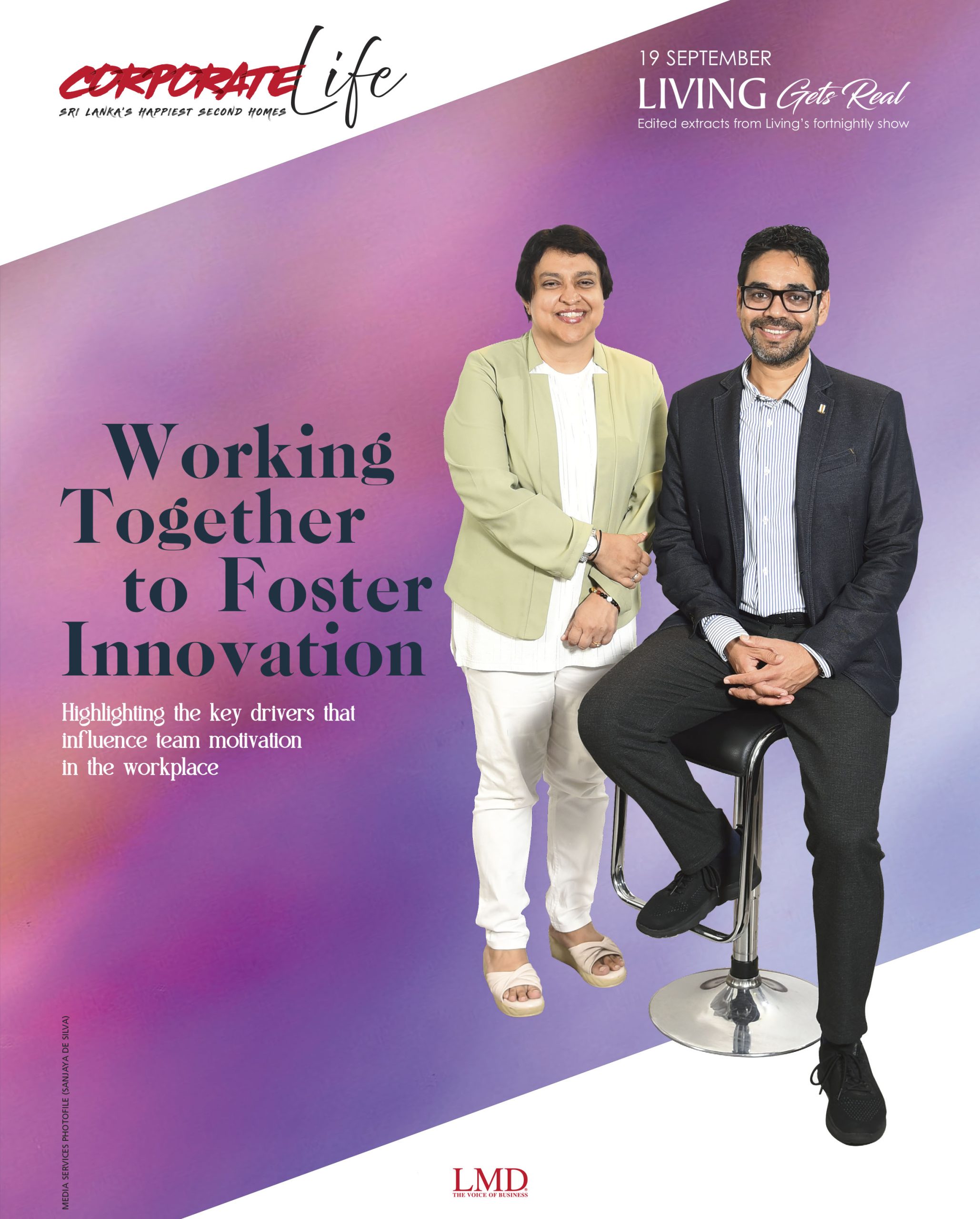SOCIAL DIALOGUE
Decent Work is Critical to Resilient Economies
Joni Simpson emphasises that employee wellbeing is key to a happy workforce

Q: How does the ILO’s mission align with promoting decent work and wellbeing in the workplace?
A: Decent work, a term coined by the International Labour Organization in the 1990s, encompasses more than simply employment – it embodies dignity, respect, fairness and aspects aligning with workplace happiness.
This agenda includes ensuring minimum rights at work, equal opportunities, and occupational safety and health.
As a tripartite organisation, the ILO’s main partners are government (Ministry of Labour and Foreign Employment), and employers’ and workers’ organisations. From the private sector, we mainly work with the Employers’ Federation of Ceylon (EFC). We also work with a number of trade unions.
This collaborative approach, which we call ‘social dialogue,’ involves bringing each party’s different perspective to the discussion to help address today’s world of work’s most pressing issues – such as employment policy that abides by international standards, social protection measures and dispute resolution, and provides support for various aspects of workers’ wellbeing.
Occupational safety and health are central to the ILO’s agenda, which impacts workplace happiness and productivity – an area that is a priority for businesses and their employees alike. Addressing safety and health concerns – such as violence, harassment and heat stress – is crucial for maintaining a healthy work environment.
In 2022, governments, employers and workers from around the globe designated that a safe and healthy working environment is a fundamental right at our International Labour Conference. It’s part of decent work and is critical to resilient economies.
Therefore, governments around the world – including Sri Lanka – are ramping up efforts with employers and workers, to provide safe and healthy working environments to all workers.
Companies are increasingly recognising that employee wellbeing affects productivity and turnover. While wages are important, non-monetary factors – such as fair treatment, safety and respect – also play a significant role in workplace happiness.
In the current context of economic crises, companies are encouraged to focus on these non-cost aspects of work to enhance employee satisfaction and performance.

Q: In what ways does the ILO’s commitment to fair labour practices contribute to fostering a happier work environment?
A: Following COVID-19, there has been a global consensus among governments, employers and workers that ensuring safe and healthy workplaces is a fundamental right of all employees. This shift underscores that occupational safety and health (OSH) standards, whether ratified as conventions or not, are essential rights.
Workers should have the assurance of safety and wellbeing in their work environments. This became particularly evident during the pandemic, as the challenges faced – such as social distancing and health risks – highlighted the need for robust safety measures.
In Sri Lanka for instance, a great deal of attention is being given to OSH with initiatives addressing the specific needs of sectors such as tea plantations, where workers face unique health challenges. Effective social dialogue – including the establishment of committees and platforms for open communication – is crucial in identifying and resolving workplace issues.
This approach fosters mutual respect and contributes to job satisfaction and overall happiness at work. By addressing both physical and psychosocial risks, and providing support through mental health resources, organisations can enhance worker wellbeing and productivity.

Q: What initiatives or programmes has the International Labour Organization implemented in Sri Lanka to foster happier and more productive workplaces?
A: The ILO works in the apparel industry under the ILO-IFC Better Work programme. In this case, we are collaborating with the Board of Investment (BOI) on promoting mental health and wellbeing for garment workers through a dedicated campaign named ‘You’re Not Alone,’ and providing workers access to professionals to discuss mental health issues.
Another initiative is the Global Early-Career Accelerator for Representation (GEAR) programme, which focusses on advancing gender equality at work by supporting women through capacity building efforts, enabling them to progress to higher level jobs and tasks.
These programmes have shown that providing development opportunities enhances employee satisfaction, loyalty and retention. Additionally, the Uplift programme, funded by Japan, ensures the safety and wellbeing of Sri Lankan migrant workers overseas, focussing on policies to protect them both as they migrate and also facilitating their reintegration upon return.
Another significant project under the UN Peacebuilding Fund promotes social dialogue through the establishment of workplace and sectoral committees, to prevent and address work related conflicts – including preventing violence and harassment in both public and private sectors.
These platforms are spaces to share issues and find solutions so that workplaces are more harmonious, and there are fewer disputes.
The ILO also supports occupational safety and health through training programmes and online platforms, ensuring that employers and workers can access essential information to foster safer and more harmonious work environments.

Q: How does the ILO ensure that global standards for employment are effectively implemented in Sri Lanka?
A: We’ve been actively supporting labour and regulatory bodies, particularly in terms of OSH standards, despite challenges with capacity and resources.
Our tripartite approach – which involves government, workers and employers – plays a crucial role in shaping national OSH policies.
The ratification of OSH International Labour Standards is essential, not only as a mark of Sri Lanka’s leadership but also because these standards are increasingly part of international trade agreements such as the EU’s GSP+ scheme.
We provide technical assistance to both government and the private sector to help companies align with these standards, with entities such as the Employers’ Federation of Ceylon (EFC) and National Institute of Occupational Safety and Health (NIOSH) playing key roles in implementation.
While international standards offer strong guidance, effective implementation is even more important, as laws alone are insufficient without proper systems and dialogue between stakeholders.
Recent efforts – including policy guidance and technical support from regional ILO teams – are aimed at addressing gaps in compliance, and enhancing social dialogue to ensure that policies are relevant, effective and implemented.

Q: How should Sri Lankan companies integrate ILO principles into their corporate culture to promote employee wellbeing?
A: Human resources and OSH policies provide a strong foundation for companies to improve their workplace practices, with resources such as guidance from the EFC and various tools available online.
Social dialogue between managers and workers is the main channel through which companies can understand the needs of their workers.
The ILO offers a help desk, primarily for larger companies, with a wealth of knowledge including Q&As addressing common challenges and the application of standards. Companies can access standard policies and adapt them without starting from scratch.
Resources such as employer guides on violence and harassment, including innovative tools such as virtual reality simulations on bystander intervention in sexual harassment, are available to enhance understanding and response.
At the workplace level, setting up OSH committees and engaging employees in open conversations about health, safety and wellbeing can significantly impact workplace culture. Encouraging staff input, fostering a fear free environment for reporting concerns and implementing channels for anonymous feedback can strengthen these efforts.
Knowledge sharing between companies – especially through initiatives such as the You’re Not Alone campaign – further supports this process, particularly for micro, small and medium enterprises (MSMEs) that may struggle to cover all necessary functions, but can benefit from accessible guidance and resources.
Q: What are the unique challenges that Sri Lankan businesses face in achieving corporate happiness?
A: Recovering from crises poses significant challenges for companies, particularly in Sri Lanka where economic strains such as high energy costs and rising living expenses have intensified. These factors impact not only the financial stability of businesses but also employee satisfaction and retention.
Companies face difficulties in adjusting salaries to match the higher cost of living and in maintaining skilled workers amid out-migration. Climate change exacerbates these issues, affecting productivity and employee wellbeing, especially in agriculture and other climate sensitive sectors.
Addressing these challenges can involve implementing low-cost high impact measures to improve workplace conditions such as enhancing work-life balance and providing flexible working arrangements.
Companies can support employees through initiatives like gradual maternity returns and flexible schedules, which can improve job satisfaction and loyalty. Additionally, fostering a supportive environment for work-family balance, including accessible childcare, can enhance employee happiness and productivity.
Recognising the importance of care and family responsibilities in promoting workplace wellbeing is crucial for developing effective policies and practices that address both immediate and long-term employee needs.
The main route to identifying the actions that are aligned with workers’ needs is to use social dialogue with workers, worker representatives and trade unions.
Q: And finally, how is the ILO working with the Sri Lankan government and businesses to advocate for policies that promote corporate happiness?
A: Efforts to enhance workplace conditions and employee wellbeing are increasingly intersecting with national policy development and international standards.
In Sri Lanka, as the country moves towards ratifying OSH conventions, it remains crucial to ensure the effective application of these fundamental standards at both the national and workplace levels.
This involves not only supporting tripartite dialogue among government, employers and workers, but also providing technical guidance and capacity building on key issues – such as social security and migration.
By promoting evidence based advocacy through research and facilitating social dialogue, stakeholders can better influence policy and reform.
Fundamental safety and health issues serve as a crucial entry point for broader discussions on improving workplace conditions and fostering a positive work environment. This approach helps address immediate concerns while opening avenues for further enhancements in employee engagement and happiness.





